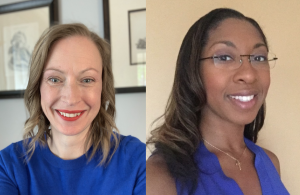The UNC Department of Medicine is pleased to introduce a new diversity and inclusion council with champions who will actively promote, celebrate and encourage engagement for diversity initiatives across the department.

Led by Keisha Gibson, MD, MPH, vice chair for diversity and inclusion, the council recognizes a department commitment to all aspects of equality and diversity, and the many differences that make the community stronger. Representing several different divisions in the DOM, these champions will strengthen the department’s ability to stay connected with the challenges, needs, and opportunities regarding diversity issues in its broadest context involving our faculty, staff, and trainees.
Following is a list of the new, formally-recognized medicine champions for diversity and inclusion.
Marjory Charlot, MD, MPH, Keisha L. Gibson, MD, MPH, Robin Howard, Onyinye Iweala, MD, PhD, Honey Jones, DNP, ACNP-BC, Karen Kimel-Scott, MD, Jennifer McEntee, MD, MPH, Noelé Daniels Parson, Lina Rosengren-Hovee, MD, MPH, Joseph S. Rossi, MD, Carlos Rubiano, MD, Saad Mohammed Shariff, MD, Junève Toche, MD, and Kisa Wilson. (See photo listing here.)
These individuals are currently meeting once a month, with initial plans to review the UNC Department of Medicine, UNC School of Medicine and UNC Hospital policies currently in place that impact diversity, equity and inclusion. The council will determine where gaps and discrepancies may exist pertaining to the department of medicine, and they will develop strategies to mitigate these issues.
Why is this work in diversity important to you?
Rosengren-Hovee: “Our healthcare system, community, and society at large will only thrive when our patient diversity is also reflected in our providers, staff and leaders. It is our duty to accept nothing short of complete equity for all underrepresented communities. The work of inclusion belongs to everyone as we advocate for our patients and ensure every voice is represented and valued in our community.”
Jones: “For me, diversity is more than just work–it’s a lived experience. Diversity is not something I can choose to put aside when it’s convenient. As a black woman, I introduce an element of diversity and call attention to it wherever I go. In that regard, I am always working. It is imperative for the health care community and the community at large to acknowledge, value and respect differences among its members. Likewise, it is critical for all stakeholders at UNC to mitigate inequities. Herein lies the work. I firmly believe this work does not just belong to me, it belongs to everybody. Everyone can leverage their position, role, authority, status and privilege to advocate for diversity, equity and inclusion in their spheres of influence.”
What is your role in the department and how does supporting Diversity, Equity and Inclusion (DEI) fit into it?
Rosengren-Hovee: “As an Infectious Diseases physician and HIV provider, I have observed first-hand the direct and detrimental effects on human health that results from stigma and discrimination. My research is a response to these clinical observations, and focuses on improving clinical outcomes for youth at the intersection of multiple minority identities. Simultaneously, as one of few queer women in the Department of Medicine, I recognize the urgent call to action to advocate for equity and representation of my own intersecting viewpoints.”
Jones: “I am an acute care care nurse practitioner in the division of pulmonary and critical care medicine. I serve as the clinical lead for advanced practice providers in the MICU. Although my primary role is to provide care for critically-ill adults, I realize that part of my purpose as a health care professional is to be a fierce advocate for diversity, equity and inclusion (DEI). This includes advocating for underrepresented minorities to be included in all levels of decision making in the health care system–whether that be academic, clinical, research or administrative. Supporting DEI initiatives will allow me to demonstrate my commitment to DEI in my profession and the health care community. Likewise, supporting DEI will help move the organization towards closing the gap in disparities in practice, education, research and leadership.”
What do you most want to accomplish on this team?
Rosengren-Hovee: “There is an urgent need to renew our diversity efforts to advance leadership and representation for women and people of color. I hope to also be an advocate for the less seen minorities, bringing visibility and representation for LGBTQ individuals, continue our work in gender equality, and bring light to intersectionality, and its role in creating a truly equitable society.”
Jones: “In the short term, I’d like for this team to bring awareness to the shadows of inequity that sit in broad daylight. In the long run, I’d like this team to be sought out by departments as a consult of sorts–to offer recommendations for incorporating DEI strategies into practice. True concerted efforts to implement DEI focused action plans will influence staff and faculty accountability to diversity, equity and inclusion.”
Photos
